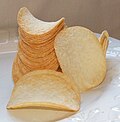Potato chip
Potato chip is a thin slice of potato that has been deep fried or baked until crunchy. Potato chips are commonly served as a snack, side dish, or appetizer. They originated in the United States, where they are known as "potato chips", and are widely sold in many other countries.
History[edit]
The potato chip was invented in 1853 by George Crum, a chef at the Moon's Lake House in Saratoga Springs, New York. Crum was trying to appease an unhappy customer who kept sending his fried potatoes back, complaining that they were too thick. Frustrated, Crum sliced the potatoes as thin as he could, fried them to a crisp, and seasoned them with extra salt. To his surprise, the customer loved them and they soon became a regular item on the restaurant's menu, known as "Saratoga Chips".
Production[edit]
Potato chips are made from thin slices of potato that are deep fried or baked until they become crisp. The basic process involves washing, peeling, and slicing the potatoes, then frying or baking them. After cooking, the chips are usually seasoned with salt or other flavors.
Varieties[edit]
There are many different varieties of potato chips, including plain (salted), barbecue, sour cream and onion, and cheese and onion. Some companies also produce "gourmet" or "premium" chips, which are made from higher-quality ingredients and often come in unusual flavors.
Health concerns[edit]
While potato chips are a popular snack, they are high in fat and calories, and regular consumption can contribute to weight gain and other health problems. Some brands also contain high levels of sodium, which can increase the risk of high blood pressure and heart disease.
See also[edit]
-
Potato chip
-
Production of homemade chips
-
Old Smith's potato chips ad
-
Potato slices in airfryer
-
Cape Cod potato chips
-
Potato Chips
-
Pizza potato
-
Crispy and spicy potato chips in West Bengal, India
-
Pringles chips
-
Monster Munch pickled onion
Ad. Transform your life with W8MD's Budget GLP-1 injections from $75


W8MD offers a medical weight loss program to lose weight in Philadelphia. Our physician-supervised medical weight loss provides:
- Weight loss injections in NYC (generic and brand names):
- Zepbound / Mounjaro, Wegovy / Ozempic, Saxenda
- Most insurances accepted or discounted self-pay rates. We will obtain insurance prior authorizations if needed.
- Generic GLP1 weight loss injections from $75 for the starting dose.
- Also offer prescription weight loss medications including Phentermine, Qsymia, Diethylpropion, Contrave etc.
NYC weight loss doctor appointmentsNYC weight loss doctor appointments
Start your NYC weight loss journey today at our NYC medical weight loss and Philadelphia medical weight loss clinics.
- Call 718-946-5500 to lose weight in NYC or for medical weight loss in Philadelphia 215-676-2334.
- Tags:NYC medical weight loss, Philadelphia lose weight Zepbound NYC, Budget GLP1 weight loss injections, Wegovy Philadelphia, Wegovy NYC, Philadelphia medical weight loss, Brookly weight loss and Wegovy NYC
|
WikiMD's Wellness Encyclopedia |
| Let Food Be Thy Medicine Medicine Thy Food - Hippocrates |
Medical Disclaimer: WikiMD is not a substitute for professional medical advice. The information on WikiMD is provided as an information resource only, may be incorrect, outdated or misleading, and is not to be used or relied on for any diagnostic or treatment purposes. Please consult your health care provider before making any healthcare decisions or for guidance about a specific medical condition. WikiMD expressly disclaims responsibility, and shall have no liability, for any damages, loss, injury, or liability whatsoever suffered as a result of your reliance on the information contained in this site. By visiting this site you agree to the foregoing terms and conditions, which may from time to time be changed or supplemented by WikiMD. If you do not agree to the foregoing terms and conditions, you should not enter or use this site. See full disclaimer.
Credits:Most images are courtesy of Wikimedia commons, and templates, categories Wikipedia, licensed under CC BY SA or similar.
Translate this page: - East Asian
中文,
日本,
한국어,
South Asian
हिन्दी,
தமிழ்,
తెలుగు,
Urdu,
ಕನ್ನಡ,
Southeast Asian
Indonesian,
Vietnamese,
Thai,
မြန်မာဘာသာ,
বাংলা
European
español,
Deutsch,
français,
Greek,
português do Brasil,
polski,
română,
русский,
Nederlands,
norsk,
svenska,
suomi,
Italian
Middle Eastern & African
عربى,
Turkish,
Persian,
Hebrew,
Afrikaans,
isiZulu,
Kiswahili,
Other
Bulgarian,
Hungarian,
Czech,
Swedish,
മലയാളം,
मराठी,
ਪੰਜਾਬੀ,
ગુજરાતી,
Portuguese,
Ukrainian










